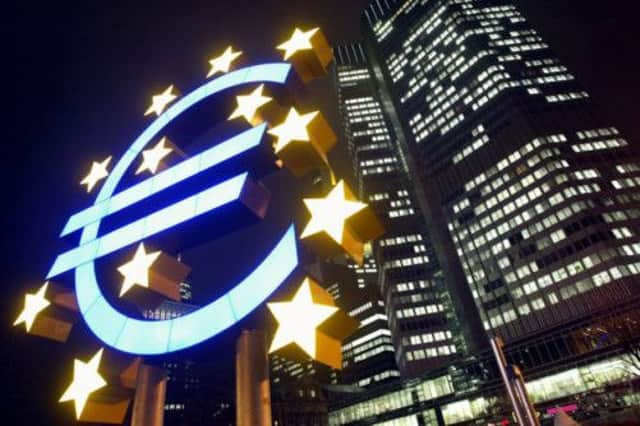UK exporters to pay price of interest rate cut


The move aims to boost the flagging economic recovery in the region and the sharp fall in the euro will help eurozone manufacturers but make exports from the UK to its largest trading partner more expensive.
Shares across Europe rose in initial reaction to the cut in the ECB’s main refinancing rate from 0.5 per cent to 0.25 per cent, making it cheaper for banks and in turn companies, to borrow.
Advertisement
Hide AdAdvertisement
Hide AdIn the UK, the Bank of England kept interest rates on hold once more amid renewed speculation that it may be forced to raise the cost of borrowing sooner than expected.
The 23-man ECB Governing Council had faced intense scrutiny after a shock slump in eurozone inflation to 0.7 per cent in October, far below its target of just under 2 per cent.
Euro policymakers have played down the threat of Japan-style deflation, which led to a “lost decade” there, but appear to be taking no chances.
“It’s very rare that we see this kind of knee-jerk reaction from the ECB, so the threat of deflation is clearly very real,” said Craig Erlam, market analyst with Alpari UK.
Rob Harbron, economist at the Centre for Economics and Business Research, said the rate change “highlights the extent of the damage done to the eurozone economy since the financial crisis began and also how far there is left for the recovery to go”.
ECB president Mario Draghi said the decision to cut rates reflected an outlook of low inflation and economic weakness in the eurozone.
He said the bank expected to see “a prolonged period of low inflation followed by a gradual upward movement towards inflation rates of below but close to 2 per cent”, and said the eurozone was seeing “weaker than expected economic activity”.
Although the Bank of England’s decision to keep interest rates on hold at 0.5 per cent once more came as no surprise, the strength of Britain’s recovery is raising the prospect of a rate hike in 2015 – a year earlier than the Bank first predicted under its new forward guidance policy.
Advertisement
Hide AdAdvertisement
Hide AdDavid Kern, chief economist at the British Chambers of Commerce said the MPC must must signal that a rate rise is likely before 2016 to maintain business confidence.
“As the pace of economic growth strengthens, it is becoming clear that the first rise in official interest rates is likely to occur well before the committee’s 2016 prediction,” he said. “The MPC must use next week’s inflation report to move towards a more realistic timetable for its forward guidance.”
Calls are also growing among some economists to raise rates now in the face of surging growth and a buoyant housing market.
In the US, figures today showed the economy growing at a faster-than-expected annualised pace of 2.8 per cent in third quarter.
But the slowest expansion in consumer spending in two years pointed to an underlying weakness.
Separate US data also showed jobless claims fell in the latest week. The number of new applications for unemployment benefits fell by 9,000 to 336,000.